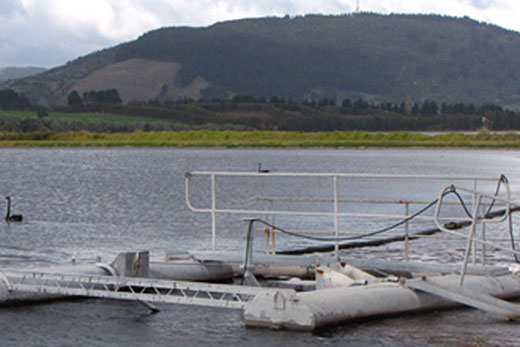The change of direction in progress at the Waste Water Management Review Committee is being passed up the chain to the next stage.
The committee's appointed Maori members are in the process of challenging the rules under which the committee operates.
A shake-up is underway at the sewerage ponds.
The ‘list of demands' or proposed rule changes are now to be considered as part of the council's governance structure review process, which is currently underway.
The WWMRC has been created out of the resource consent process that allows the city council to operate its Te Maunga wastewater ponds and outfalls. The consent requires the Tauranga City Council to have a joint council/Maori committee to administer a court ordered fund of ‘not less than' $250,000 and distribute it to the local affected iwi and hapu.
The council paid into the fund at $50,000 a year for five years before any distribution was made. There have been only two successful applicants securing funding to a total of $160,000. The committee's reason for existence is to distribute the fund, which it has failed to do.
There is $92,400 left. The council is 10 years into the consent. The Maori members also want the council to approve in the Long Term Plan, an additional $50,000 a year for five years, which will bring the cost of the coastal discharge consent up to $1.5 million.
A submission was made, but it was ‘overlooked' in the deliberations phase says committee chairman councillor Rick Curach, after this week's meeting.
The Maori committee appointees want the WWMRC to be able to meet more than twice a year, another $50,000 each year from the city council, and the authority for the committee itself to hand it out at say, $30,000 a time.
Nga Potiti comittee member Tama Hovell says the additional $50,000 a year reflects the on-going and significant effects of the Te Maunga plant operations on the environment which are not avoided, remedied or mitigated.
Tama says the reason there is still money in the account is because the committee's policy doesn't match the terms of the consent. He's also got concerns about the committee conflicts of interest policy, which relates back to the time of the applications when committee members were barred from helping to assess or decide upon applications from iwi or hapu groups they might be considered to have an affiliation to.
'As I understood it members of the committee were disqualified from being able to consider the applications because they had affiliations with the groups that were actually applying,” says Tama. 'So it was a strange situation when you have members appointed to this committee because of the affiliations that they had, but being unable to perform their function (of assessing applications from local iwi and hapu) because of those affiliations.
The Wastewater Management Review Committee is unique among council committees being created by decree, as part of the sewerage discharge consents the council obtained from the BOP Regional Council in 2004 concerning the treatment plant and ponds in Rangataua Bay.
Its sole job is to receive the monitoring reports on the city's wastewater scheme, and make recommendations to the council, and make decisions about spending the environment mitigation and enhancement fund – of not less than $250,000.
Even its 50/50 make-up of half councillors and half tangata whenua appointees is determined by the consent.
The committee has eight members, four councillors and four appointed representatives of the Ngati Ranginui and Te Runanga o Ngaiterangi Iwi Trust and two members as representatives of the Nga Potiki Kaitiaki Resource Management Unit.
This is the third council the Wastewater Management Review Committee has been part of, and the first to have a deputy chair, Matire Duncan, from the appointed membership.
While the committee has been running for more than six years with 50/50 representation and guided by Treaty of Waitangi principles of partnership, she still had to remind the council of its responsibilities through a notice of motion.



3 comments
change of direction ?
Posted on 26-06-2015 21:01 | By YOGI BEAR
Waste water never changes direction, it is always heading the same way, sink and into the ocean.
hand outs?
Posted on 27-06-2015 12:01 | By YOGI BEAR
This is a rort on TCC ratepayers, TCC have already paid over the agreed sum for "research" and that was madness in the first place anyway. Why are these gold diggers allowed to continue with tis stuff and mess up everyone else's lives, spend other money on what?
Not correct Tama, you've been misled
Posted on 27-06-2015 14:04 | By Murray.Guy
Tama says the reason there is still money in the account is because the committee's policy doesn't match the terms of the consent. He's also got concerns about the committee conflicts of interest policy, which relates back to the time of the applications when committee members were barred from helping to assess or decide upon applications from iwi or hapu groups they might be considered to have an affiliation to..... All that preceded is factually incorrect. Funding is made available subject to the terms set out by the Resource Consent, NOT by Council policy. No committee member was 'barred'. The committee members themselves acknowledged they were directly involved with an application and had a conflict of interest. To better ensure impartiality ALL committee members agreed with that applications be accessed by experts independent of the Committee. The committee voted as the expert recommendations.
Leave a Comment
You must be logged in to make a comment.